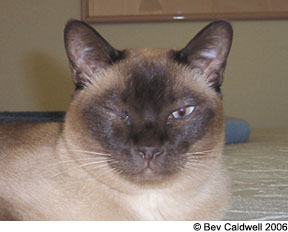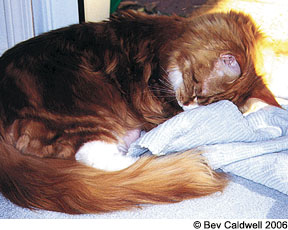Youve got the worst cold of your life. Youve called in sick to work and now youre lounging under the blankets, watching TV. Who comes to snuggle up with you? No one else but your warm and adorable feline. What could be better at a time like this?

288
But wait: Could you pass on your clogged sinuses and raspy cough to your cat? Rest assured – you cannot pass on a cold to your cat and you cant catch one from her. In general, cold viruses are species-specific, meaning that they infect only the host they are genetically wired to infect, says Jane Brunt, DVM, of the Cat Hospital At Towson in Baltimore, Maryland.
While human colds (most often caused by a rhinovirus) are usually something that we can endure without medical treatment – except to ease symptoms – colds in cats can be quite serious and should be checked out by a veterinarian. And because colds can spread very rapidly from one cat to another, it is vital to seek treatment before the whole cat household is infected.
The Cold Facts
The most common type of feline cold virus is the feline herpesvirus (FHV). Infection with this virus results in cold-like signs, not sores as in the human version of herpes infection. Another common feline cold virus is feline calicivirus (FCV). In both cases, signs are usually mild but can become severe. Interestingly, colds – in cats and humans – generally last between seven and 10 days.
Cat colds usually occur when cats are in close contact with each other. Shelters and boarding facilities tend to have a higher feline population in the summer months, and this is the season when you may see more cat colds occurring. But outbreaks can occur at any time, says Dr. Brunt. Keeping your cat indoors is one way to decrease the chance of infection or outbreak.
If your cat gets a cold, the signs will be familiar to you because many are similar to those you have when you catch a cold. Look for sneezing, runny nose, coughing, wheezing, mucus discharge from the nose or mouth, breathing problems, oral ulcers and conjunctivitis (red, teary eyes with a discharge).
Colds in cats are referred to as upper respiratory infections (URI). These affect the nose, throat, trachea and eyes, leading to the symptoms above. The URI may progress to lower respiratory infections that involve the bronchi or lungs, but these are less common in cats.
When these infections are uncomplicated, they may be no more severe than the common cold in people. But even mild infections may become dangerous if secondary bacterial infections occur in the nose, oral cavity or eyes.

288
The other problem is that, once a cat has developed a respiratory infection, he or she may never really get rid of it, and the infection may recur in times of stress or other illness. Feline herpesvirus is similar to the human herpes zoster (cold sore) virus in that, once an individual is infected, he is considered infected for life. Flare-ups can occur years later, says Dr. Brunt. Remember, though, that we cant get cat herpes and cats cant get human herpes.
Cats like to smell their food before eating it, something they cant do if their noses are stuffy. Therefore, many cats with URI will often refuse to eat, and this is a problem. If cats dont eat or drink enough, they can dehydrate and start to use their own fat stores for energy, says Dr. Brunt. This increases the risk for complications like hepatic lipidosis, or fatty liver syndrome. And this can be life-threatening.
Treatment Options
If your kittys cold lasts more than a couple of days or your cat stops eating or seems weak, seek attention from your veterinarian, says Dr. Brunt.
Should your cat be treated at home or in the hospital? It all depends on the individual situation, says Dr. Brunt. If your cat is eating and drinking and youre able to give your cat any medications that your veterinarian prescribes, then its a good idea to treat your cat at home where he is most comfortable. However, if your cat refuses food and drink or has another illness, such as diabetes, hospitalization may be in the best interest of your feline.
Treatment for a cat cold is symptomatic and supportive, depending on the severity. Your veterinarian may prescribe chicken soup for cats in the form of fluid and nutritional support, along with antibiotics, if needed, says Dr. Brunt.
To prevent colds, follow your veterinarians recommended schedule of feline herpesvirus and calicivirus vaccinations. Most current guidelines call for vaccinations at kittenhood, a booster at one year of age and then vaccinations every three years.
Says Dr. Brunt, It may also help to wash your hands and change clothing if you visit a shelter, cattery, kennel or even a veterinarians office where there could be a higher chance of infectious agents around.
If your cat does catch a cold, TLC is always called for. And dont forget to wipe your cats nose gently with a damp, warm cloth. As smart as your cat may be, she will probably never know how to blow her nose.



